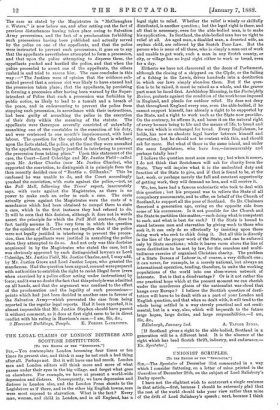HE LEGAL CLAIMS OF LONDON DISTRESS AND SCOTTISH DESTITUTION.
[TO THE EDITOR OF THE "BrEcTATOP."1
SIR,—You contemplate London becoming four times or ten times its present size, and think it may be not such a bad thing after all. Perhaps not. But it will have one bad result. London men and London editors will think more and more of what passes under their eyes in the big village, and forget what goes on elsewhere. For example, we have at present a world-wide depression and distress. Consequently, we have depression and distress in London also, and the London Press shouts to the Legislature as if there, and in the other big English towns, men were most exposed to starvation. What is the fact ? Every man, woman, and child in London, and in all England, has a legal right to relief. Whether the relief is wisely or skilfully distributed, is another question ; but the legal right is there, and all that is necessary, even for the able-bodied man, is to make his application. In Scotland, the able-bodied man has no right to relief at all. An aged man, a disabled man, a deserted wife, an orphan child, are relieved by the Scotch Poor-Law. But the person who is none of all these, who is simply a man out of work and unable to get work, such a man in any Scotch county, or city, or village has no legal right either to work or bread, even for a day.
Hitherto we have not clamoured at the doors of Parliament, although the closing of a shipyard on the Clyde, or the failing of a fishing in the Lewis, drives hundreds into a destitution in which our laws simply abandon them. But if the ques- tion is to be raised, it must be raised as a whole, and the graver
part must be faced first. Archbishop Manning, in the Fortnightly Review, protests against the condition of the workhouse imposed in England, and pleads for outdoor relief. He does not deny that throughout England every one, even the able-bodied, if he cannot support himself, has already a right to be supported by the State, and a right to work such as the State now provides. On the contrary, he affirms it, and bases it on the natural right of every human being to life and the means of life, to bread and the work which is exchanged for bread. Every Englishman, he holds, has now an obsolete legal barrier between himself and starvation ; but he should not be content with this, and should ask for more. But what of those in the same island, and under the same Legislature, who have less,—immeasurably and perhaps fatally less ?
I believe the question must soon come up; but when it comes, I do not think that Scotchmen will ask for charity from the State. They will inquire what it is the undoubted duty and function of the State to give, and if that is found to be, at the last, work, or perhaps merely the full and constant opportunity of getting work, they will demand no less, and will receive it.
We, too, have had a famous ecclesiastic who took to deal with this question ; but his proposal was to relieve the State of all compulsory assessments, and to offer, on behalf of the Church of Scotland, to support all the poor of Scotland. So Dr. Chalmers theorised a generation ago, erring on the opposite side from some of his successors. Is it not possible for the Church and the State to partition this matter,—each doing what is competent to each, and what is best for each P If the State is bound to stand between men and starvation by giving work to those who seek it, it can only do so effectually by insisting upon those doing work who seek to shirk doing it. But all this is directly in the line of the proper work of the State, and can be enforced only by State sanctions ; while it leaves room above the line of mere destitution to be met by law, for the ceaseless and multi- tudinous exercise of organised Christian charity. The problem of a State Bureau of Labour is, of course, a very difficult one ; it can never, for example, be a merely national, but always an international operation, tending, therefore, to unite the working populations of the world into one close-woven network of interests. But is that a disadvantage ? Or is it not rather the one practical hope which at the present moment we can cherish under the murderous gloom of the nationalist war-cloud that hangs over Europe ? I believe the Scottish question of desti- tution will have to be dealt with as a part of your London and English question, and that when so dealt with, it will tend to the whole being settled in a way sternly practical and not senti- mental, but in a way, also, which will bequeath to the future large hopes, large duties, and large responsibilities.—I am, Sir, &c., [If Scotland gives a right to the able-bodied, Scotland in a generation will be a different land. It is the absence of the right which has bred Scotch thrift, industry, and endurance.— ED. Spectator.]






















































 Previous page
Previous page